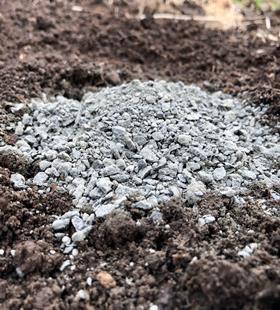
A certain type of crushed rock could help growers absorb more carbon in their soil, research by the Scottish Organic Producers Association (SOPA) has revealed.
The project called Rock on Soils, carried out at Rotmell Farm in Perthshire, showed that usingcrushed basic silicate rock as an input gave soil amore balanced and higher value microbial biodiversity.
With access to the latest DNA techniques, the research team looked at what roles these microbes have in the soil. The data revealed an increase in microbes that sequester carbon and help provide nitrogen, phosphorous and potassium for plants, as well as an increase in microbes that help defend crops from pests and diseases.
This positive effect was still being seen three years after treatment, suggesting he benefit is still there well after the product was applied.
Project manager Emily Grant said:“This is a really exciting outcome. The effect we have seen at Rotmell is important and suggests wider benefits of this product than just carbon sequestration. In short, the beneficial bugs are being favoured – we are seeing a better soil microbiome.”
The projectwas run with funding from the Scottish government’s Knowledge Transfer and Innovation Fund (KTIF) and saw scientists and farmers working together. They were looking to determine the rock’s carbon sequestration potential alongside any additional soil and biodiversity benefits.
SOPA collaborated with Abertay University, the James Hutton Institute, the University of Dundee, and the Agrosphere Institute at Forschungszentrum Jülich in Germany, with farmer involvement from Alex Brewster of Rotmell Farm.
Dr Alexandra Morel, project partner from University of Dundee, said she was “very excited to explore these effects further and on different farm types”. However, Matt Aitkenhead from the James Hutton Institute stressed that “novel land management approaches such as crushed silicate rock application need robust testing and evaluation”.



